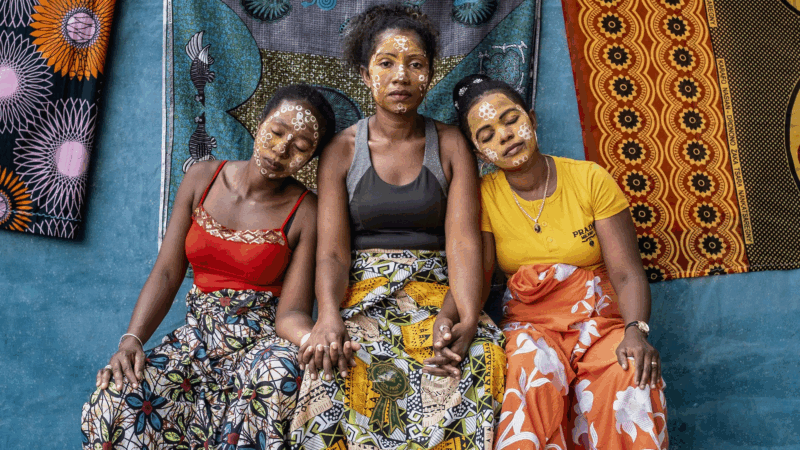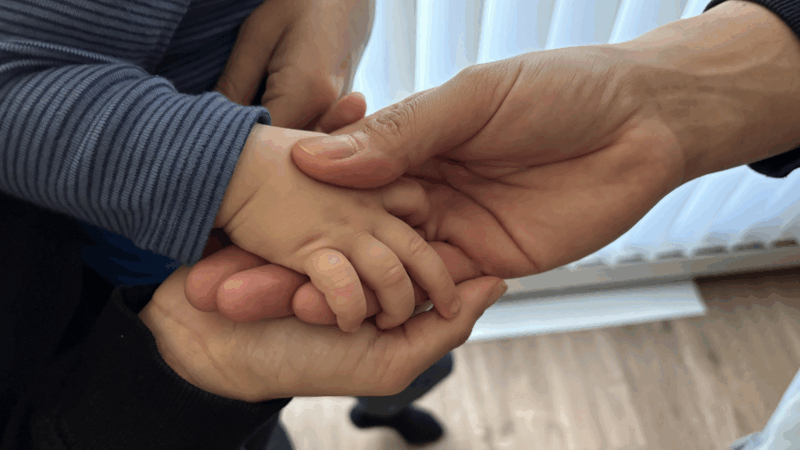Photos: Why it took courage for these women to pose for the camera
A woman named Sylvia Razanaparana, robed in a white dress atop a marine blue shirt, faces the camera with a blue bucket atop her head. The backdrop is sea blue canvas dotted with drops of white. Her hand propped on her hip, she stares at the camera at a three-quarter angle, as if she has something to show, or say.
And she does.
She is one of eight women who posed for photographer Miora Rajaonary for a project to raise awareness of female genital schistosomiasis (FGS), a disease that, according to the World Health Organization, afflicts an estimated 56 million women and girls, mainly in Africa.
The waterborne infection is spread by parasitic worms and is found particularly in areas with limited access to clean water and health care. It is contracted through contact with infected water in which women work (such as rice fields), bathe and do laundry. Considered by the United Nations as one of the most neglected of tropical diseases, it can result in infertility, ectopic pregnancy and genital ulcers. And because its symptoms — including vaginal itchiness and discharge, bloody urine and abdominal and pelvic pain — can resemble those of sexually transmitted diseases (STDs), their onset can bring suspicion, shame and dishonor on those who contract them.
A report by the U.N. agency UNAIDS characterizes the disease as “underdiagnosed, with grave implications for women’s sexual and reproductive health.” It is also linked to a higher risk for contracting HIV from an infected partner.
Men can contract the disease as well but a WHO report notes that “the clinical signs and complications are much more prevalent in women.”

Razanaparana contracted FGS while working in the rice fields of Ambanja, in northern Madagascar. Her husband accused her of betraying him because of the STD-like symptoms and left her. Only after suffering from the symptoms for four years was she able to be seen by a doctor, visiting her village as part of a medical mission. He quickly diagnosed her, and the deworming medicine praziquantel cured her.
Her story spoke powerfully to Rajaonary, who has included her portrait in her photo exhibit Sahy Rano, currently on display at the Photoville Festival in Brooklyn, New York. The title is a Malagasay phrase translated in a wall label as meaning “someone who is not afraid to dive into the water, even if there is a strong current.” It also also means “someone is really brave,” adds Rajaonary, who is herself from Madagascar. Her work was supported by the End Fund, a philanthropy that works to prevent the spread of neglected tropical diseases

The title of the project, says the photographer, is especially apt because some of the women, like Razanaparana, work in the rice fields “so they have to be in the water for their livelihoods. They have no choice but to keep going back” returning to the very waters where they were initially infected.
To further emphasize their courage in breaking taboos and coming forward to speak about the disease in public, the women portrayed wear traditional Malagasy face masks. Made of cosmetic paste and ground sandalwood, they are both decorative and used to protect the skin. In adorning themselves with beauty masks, they are showing they are like everyone else, with no need to hide. “I sometimes wear a mask when I am on holiday in Madagascar,” Rajaonary says. They are very attractive. This is a tradition over centuries.”

The effect of the painted backdrop, prepared by Rajaonary, is that the women appear to be standing against, or sitting in the water. The white dots, she says, are symbols of the parasites that infest local waters.
She also set up a laundry rope across the canvas backdrop, from which hang the women’s shirts, sheets, dresses and clothing — as if the clothing had just been put up to dry after being washed in the contaminated water. “This is their clothing, their laundry, what they wear and how they live,” she said.
The colorful pails and buckets visible in each photo also call attention to water’s inescapable presence in the women’s lives.
Diane Cole writes for many publications, including The Wall Street Journal and The Washington Post. She is the author of the memoir After Great Pain: A New Life Emerges. Her website is DianeJoyceCole.com
U.S-Israeli strikes continue across Iran, Iranian drones hit Azerbaijan
The U.S. and Israel said they conducted new strikes inside Iran overnight, targeting ballistic missile launchers. Iran claimed it struck a U.S. oil tanker in the northern Persian Gulf.
In lawsuit, Minnesota accuses Trump administration of ‘weaponizing’ Medicaid funding
The federal government said the state should do more to fight fraud and is holding back funds. Minnesota officials say the attack is unfair as the state's fraud rate is well below national averages.
Wall Street is betting on tariff refunds after Supreme Court ruling
When the Supreme Court struck down many of President Trump's tariffs, it left importers wondering how long they'd have to wait to get their money back. Hedge funds are offering to help out.
A run for their money: Young candidates rival older incumbents in midterm fundraising
As a growing crop of young candidates challenge longtime Democratic incumbents, some are not just breaking through in the money race, but outraising their opponents altogether.
Announcing the 2025 NPR College Podcast Challenge Honorable Mentions
Here are some of the best entries in NPR's 2025 College Podcast Challenge.
When ICE came, Minneapolis created underground health networks. Should other cities?
The Trump administration's immigration crackdown in Minneapolis forced some families into hiding and catalyzed informal medical networks to deliver critical health care services inside homes.








